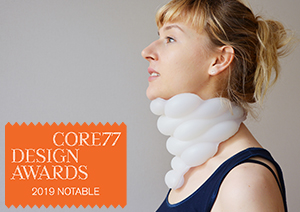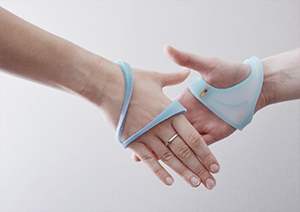





Silicone Valley. Breaking Techno-Mediated Habits.
This work explores the effects of networked technologies on our sense of self, spatial perception, and social life, through our emergent techno-mediated habits. These include a range of habitual patterns that emerge from our interactions with networked devices and coded spaces; from socially recognizable gestures and personal quirks, to nervous tics and compulsive behaviors. They are explored through a series of speculative devices that challenge or reinvent them.
This project received a Student Notable honor in the 2019 Core77 Design Awards.
This work explores the effects of networked technologies on our sense of self, spatial perception, and social life, through our emergent techno-mediated habits. These include a range of habitual patterns that emerge from our interactions with networked devices and coded spaces; from socially recognizable gestures and personal quirks, to nervous tics and compulsive behaviors. They are explored through a series of speculative devices that challenge or reinvent them.
This project received a Student Notable honor in the 2019 Core77 Design Awards.
Master-Thesis SoSe 2018
Pinelopi Papadimitraki
Betreuung:
Professur Bauformenlehre
Prof. Dipl.-Ing. Dipl.-Des. Bernd Rudolf
Professur Interface Design
M.F.A. Jason Reizner
University at Buffalo, SUNY
Prof. Mark Shepard
The ongoing synergy between computational and spatial practices has produced a series of hybrid ensembles, two of which are the subject of this work; networked devices and coded spaces. Their personal and socio-political role is explored through notions of ‘extended’ cognition where the body, along with its technical extensions and its environment, constitutes the medium of cognitive processes. In this light, the specifics of networked life are expressed in our emergent techno-mediated habits. The argument is made that habitual behavioral patterns (simultaneously personal and universal) are irrevocably bound to the networked technologies that sustain them. Taking a critical design approach, this work imagines five speculative devices that break or make techno-mediated habits, as a means to enact alternative interaction repertoires between ourselves and our environment.
Detext is a device that situates the wearer’s attention in context whenever he or she is on the move. Lax is a mouse that interrupts stressed workflows to introduce restorative environmental stimuli and social interactions. Airborne is an apparatus that senses air pollution, nudging the wearer to seek safer personal atmospheres within the city.Meetspace is a device that exploits the wearer’s online ‘filter bubble’ to initiate encounters that celebrate socio-political diversity in urban space. Z-Shell is a device that restores the bed as a tranquil retreat through a shared bedtime ritual.
